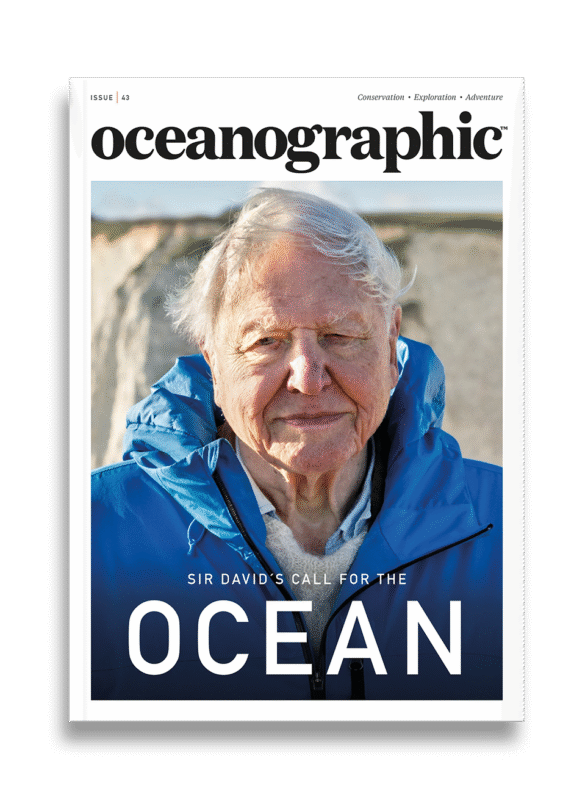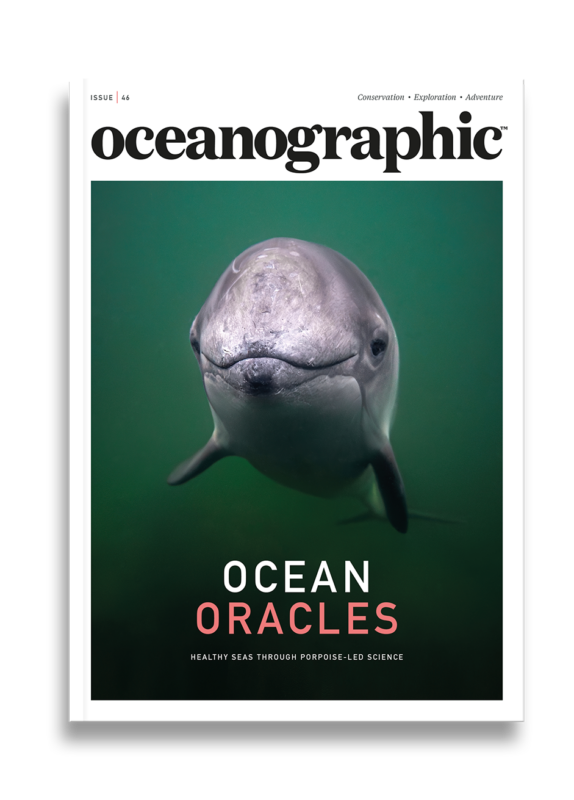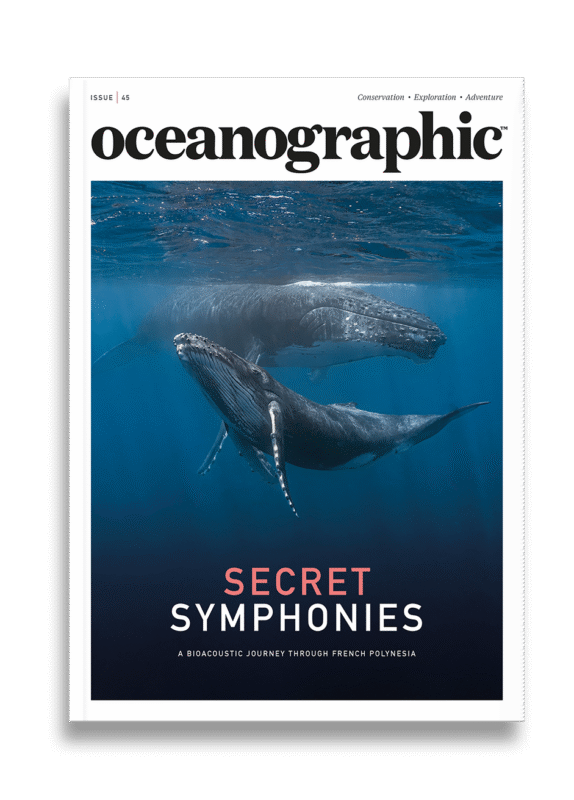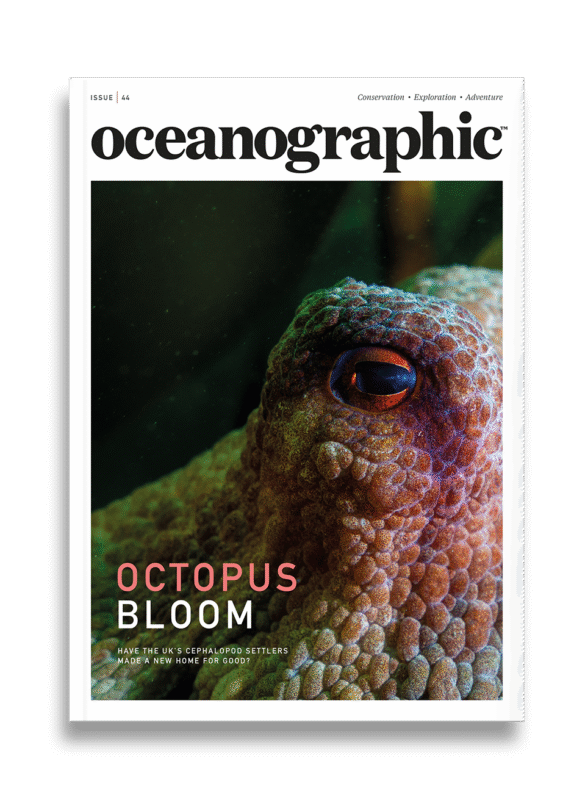Beyond the fear
Shark Week should be every week, says diver and shark advocate Julie Andersen.
A passionate grassroots activist, she has developed a unique specialty in sharks as a founder of Shark Savers, Shark Angels, Fin Free and United Conservationists. Now, in her current role as the Global Director, Brand for PADI Worldwide, she is focused on inspiring people of all ages to follow their passion and connect with our blue planet so that they, too, are inspired to seek adventure and save the ocean. Few people leave successful careers to pursue a passion for the oceans and, in doing so, take on one of the hardest PR jobs on the planet. Julie has always been drawn to the watery world – and has made it her lifelong passion as well as career. A diver for over 20 years, she has spent two decades working for the ocean as a conservationist as well as a marketing expert. She has started several NGOs and has worked as an executive in the dive industry for over 15 years. Just in time for famous Shark Week, she caught up with Oceanographic.
Oceanographic Magazine (OM): To celebrate Shark Week, what would you like to happen in shark conservation?
Julie Andersen (JA): I’d love it if every one of the viewers of Shark Week turned their fascination with sharks into positive action – and did at least one thing to protect sharks – and their watery homes. Because the truth is, every single person has the power to bring about change, small changes add up, and together, we can make a difference. I’ve experienced it, witnessed it and even had the honour of fuelling it time and time again. Anyone can become a guardian angel to the sharks – and you certainly don’t have to be a diver like me. Get educated on the issues and then take action. Lobby for their protection, vote with your dollars, volunteer for a marine conservation organisation, educate people about misconceptions, read labels and ensure you aren’t unknowingly buying shark products, swim with sharks to prove their value… whatever you do, just get involved. After all, it’s not just about the sharks – it’s about the oceans and our collective futures.
OM: How did your fascination with sharks develop?
JA: I have always been drawn to the shark’s watery world. Their powerful grace and undeniable presence has fascinated me since my first encounter. Solo on a dive safety stop, relishing those last few moments underwater, I suddenly felt I was not alone. Glancing left, much to my initial terror, a huge scalloped hammerhead appeared next to me. But gazing into the eyes of the animal I was taught to fear, I saw life – not a cold, cruel stare. And then with a flick of her tail, she was gone. That day, she sealed my fate. This fascinating creature exemplified all that is beautiful on this planet. The extraordinary power of nature. A vital reminder of what we must respect and protect. I went to work for the sharks shortly after that – and since then, have been on a mission, both personally and professionally, to protect them – and their watery homes. My passion is also my purpose – and I’m lucky enough to have the power of PADI, Shark Angels, and PADI AWARE supporting this mission.


OM: Do you have a favourite shark?
JA: I love sharks. PERIOD! From the adorable endemic cat sharks of South Africa to the iconic Great Whites. Sharks are simply incredible. Here’s an animal that has survived five major extinctions and has been on the planet for 450 million years literally forming our oceans as we know them. They are the perfect predator. And when you get to know sharks, you realise that the term mindless monster couldn’t be farther from the truth. Scientists have proven they each have unique personalities, they can recognise one another, they form social bonds, and they have cognitive abilities that rival dolphins. Last year scientists proved that sharks even had ‘besties’! That’s the thing, we are still learning so much about sharks. Even though they have their own week, there is a lot we don’t know.
But if I have to pick, I’d say the Great Hammerhead. I love that hammerheads are proof weird is wonderful – regardless of species! Who doesn’t love that iconic and bizarre looking hammer – also called a cephalofoil? They literally give hammerheads superhero powers… I mean even more than most sharks who have seven highly evolved senses. Not only can they feel the heartbeat of their prey hidden in the sand, but they can see 360 degrees at all times. Evolution at its best.
OM: What work are you doing with Shark Angels?
JA: As the founder and chairman of the board, I am still heavily involved in the strategy of Shark Angels, while serving as a positive PR rep for the sharks. I think it’s time to re-invent conservation and our collective approach – making it something that is inclusive, hopeful, and contagiously fun in the process! Simply put, as guardian angels to sharks, we are on global mission to stand up for sharks and their watery homes, leaving this beautiful, blue planet in a better state than we inherited it in. Since 2007, Shark Angels around the globe have come together to stand up for sharks and our beautiful blue planet. We turn the collective fear of sharks into fascination, empower through education, and connect the passionate to spark meaningful, local change. The Shark Angels are leading a positive, contagious movement to save sharks – and the oceans. We are a passionate, global community that believes in the power of education, media and local grassroots campaigns. We raise awareness to the critical issues, educate children, change perspectives, and empower and connect advocates to act locally to save sharks and the critical ecosystems they support.
OM: Why is the conservation of sharks so important?
JA: Love them or hate them, we need sharks on this planet. Sharks have formed our oceans and have sat atop the food chain for 450 million years, surviving five major extensions. Without sharks, the food web collapses and everything underneath them is in jeopardy. Local studies around the world have proven the removal of sharks causes the complete collapse of the ecosystem. And the oceans are our most critical ecosystems. The ocean provides one third of the global population with food, removes nearly half of the carbon dioxide on this planet and provides more oxygen than all of the rainforests combined. Our very life depends on the health of the oceans – and in turn, healthy shark populations.



OM: How is climate change affecting sharks?
JA: There is no denying our impact on the oceans over the last century has been greater than all previous centuries combined. We are quickly changing the oceans’ chemistry, temperature and biodiversity while at the same time, only just beginning to understand these changes’ implications. We know so little really; we are still learning about the oceans’ important role in our climate, atmosphere, and planet, still exploring their depths, and still discovering their inhabitants. And as we slowly build our knowledge base, human-driven phenomenons such as pollution, habitat destruction, global warming, and overfishing are ravaging our seas – and all that dwell within. Sharks, unfortunately, as apex predators are impacted by all of these things.
I often think of sharks as ‘canaries in the coal mine’, since we are so collectively obsessed with their behaviours, nearly every shark study, incident, and behaviour generates news, serving as decades of documentation. We simply can’t get enough shark stories and even regional shark news goes global. So, while many other species are impacted, the fact sharks dominate the media and pop culture makes us highly attuned to the significant impacts climate change is upon them. Simply do a google news search and you’ll find dozens of recent, relevant articles from around the world from Egypt to the US and from South Africa to Australia. As we see warmer waters extending much further north – that means shark food sources, and the sharks themselves are extending their ranges, while others are changing their preferred food sources or even turning from hunters to the hunted. We’re already witnessing trophic changes in the food web, shifting ocean currents and temperature changes impacting migration and timing, and even, fundamental changes to their very biology.
OM: What role does social media play in shark conservation?
JA: To me, there are two types of people. People who respect and admire sharks, and those that don’t… simply because they don’t have all the information. That’s where social media comes in. Say the word ‘shark’ and it strikes a primal fear in most. Sharks have been misportrayed as man-eating monsters, driving not just a collective fright, but often a deep-seated hatred. I believe that tolerance and understanding starts with education. That couldn’t be more true when it comes to sharks. We don’t want to protect or save something we are afraid of, and when it comes to sharks, much of that fear is completely unfounded. That’s why I love creating beautiful images interacting respectfully with sharks that grab attention, stop the endless scrolling, question perceptions, and hopefully start a conversation. Visual media, in a single image, has the power to spark change – and there is no better way to share that than social media.
So, as a Shark Angel and also as the Global Director of Brand for PADI, I’m on a mission to change people’s fear of sharks – one of the biggest issues standing in the way of their conservation – into fascination using media. And then, I want to turn that appreciation into passion and ultimately, action for as many people as possible. Because let’s face it, sharks need all the help they can get. In doing so, we’re igniting change for the oceans, our planet and one another. By harnessing the power of innovative education, citizen science, and advocacy programs largely through social media, we can not only shift perspectives but turn haters into activists, giving them the tools and the community support to protect what they love. And frankly, it isn’t just about sharks for me. By rethinking the shark and changing the dialogue to understanding, tolerance and respect, it’s my hope we can then extend that interspecies kindness to one another.



OM: What other projects are planned for this year?
JA: This year is an important one for sharks, with the most significant shark proposal in CITES history going to the floor for a vote with solid backing. The proposal put forth by Panama and supported by the EU aims to bring the majority of the shark fin trade under sustainable trade limits for the first time by protecting over 50 requiem shark species. Both PADI AWARE (PADI’s conservation organisation) and Shark Angels have complimentary campaigns to support this landmark legislation through education, local action, awareness and activating the passionate globally. Shark Angels is focused on sparking the next generation of conservationists, developing and mentoring young eco-heroes through the launch of ‘Shark Angels U’, providing much-needed, balanced shark conservation education to schools around the world building local awareness and diving change, employing innovative media to work for sharks, and changing perspectives about sharks thru our ‘Meet a Shark’ programme, turning those afraid of sharks into their advocates.
PADI AWARE is mobilising ocean torchbearers to protect sharks and their habitats through the introduction of new shark conservation specialties, Adopt the Blue (aimed at protecting 30% of the ocean by creating local, networked MPAs, and the largest Global Shark Census will be launched in April 2023, giving divers and non-divers an opportunity to get directly involved in shark conservation.
Additional photographs by Neil Andrea, Rayna O’nan, Rodrigo Friscone, Andy Casagrande, and Beqa Adventure Divers.
Printed editions
Current issue
Back issues

Back Issues
Issue 43 Sir David Attenborough’s ‘Ocean’
Enjoy so much more from Oceanographic Magazine by becoming a subscriber.
A range of subscription options are available.






